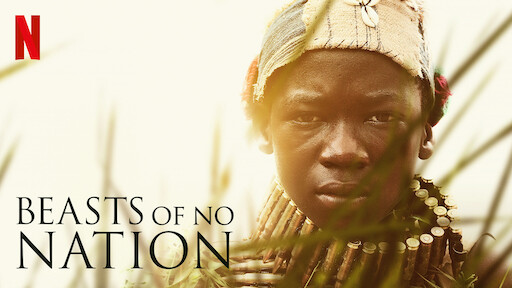
Beasts of No Nation is a motion picture by Cary Fukunaga. And when I say “by”, I mean that every aspect of this film has his fingerprints. With experience in both film and television (with credits on everything from Jane Eyre to True Detective), Cary Fukunaga clearly set out to make his own specific vision. Writer, director, cinematographer, and even cameraman when a leg injury took out the cameraman who had been shooting the film.
A film about a young boy who is drafted into being a child soldier in a horrific war, the film is based of of the Uzodinma Iweala book of the same name. Cary Fukunaga researched child soldiers and the Sierra Leone Civil War for six years before coming across the electric-prosed novel. “I read through the novel and I loved the elegant and concise way that Uzodinma Iweala told the story.” Fukunaga said, “I felt that would be the best way to enter the subject.”
Fukunaga was clearly avoiding making Beasts of No Nation an “issue movie”. There is no specific, based-on-a-true-story conflict. There is no specific place or time that this story takes place. He does not want to educate you and impassion you into action for a specific cause. This movie, instead, is about the emotional damage that is suffered by child guerrilla fighters worldwide. The spiritual conflict that lies within growing up witnessing (and committing) these atrocities, and how that affects the young, is clearly the central idea of this movie.
Fukunaga is aware of the emotional toll this takes on viewers. “No one’s gonna want to watch it, even if they hear it’s a good film,” he said before the release, noting how tough it is to persuade people “to make the time to watch something that’s emotionally taxing.”
The most notable thing about Beasts of No Nation, however, is that it may well be a model for future distribution. In an ever-changing media climate, how we will and how we will want to consume our entertainment is never a certainty. This film is the first fictional feature distributed by Netflix. They purchased the rights for distribution worldwide for $12 million. It was the first film to be released the same day on Netflix and in theaters. Considering this simultaneous release a violation of the unregulated but standard 90-day-release window that usually gives cinemas exclusivity, the four largest theatre chains in the United States (Cinemark, AMC, Regal, and Carmike) announced that they would be boycotting the film. Released by smaller cinemas and independent chains, the opening box office was less than stellar.
Netflix, however, isn’t complaining. According to Netflix chief content officer Ted Sarandos, that doesn’t matter. Although historically Netflix never shares and, in fact, closely guards its streaming numbers, Sarandos revealed that the movie has already gotten 3 million views in North America. “I think [that] is a bigger audience than any specialty film could ever hope for in its first two weeks of release, and maybe for its entire run,” Sarandos told Deadline. “We are just thrilled with the total audience reach of this film, not just in North America but the world. In the first week of release, Beasts of No Nation was the most watched movie on Netflix, in every country we operate in.”
This change in distribution was certain to challenge the Academy of Motion Picture Arts and Sciences’ definition of what a movie actually is. What kinds of filmed entertainment should qualify for Oscar noms is a constantly-moving line that is getting blurrier every day. With made-for-TV movies, streaming services like Netflix, and DIY films and webseries letting filmmakers adhere to ANY rules, quality content and history-making releases are happening more and more with less and less ability to fit into the Academy’s mould.
Though Netflix was certainly pushing for Oscar recognition with Beasts of No Nation, no nominations were received in any category.
Though it did not get a nod from the Academy, Rotten Tomatoes, a ratings and review site with a notoriously critical eye has given it a rating of 91%. So, though Cary Fukunaga knows it will be hard for you to get yourself motivated to watch it, I recommend you see it. And not simply for the emotionally compelling story. Watch it because it is part of the way filmmakers are changing the entertainment industry every day.
